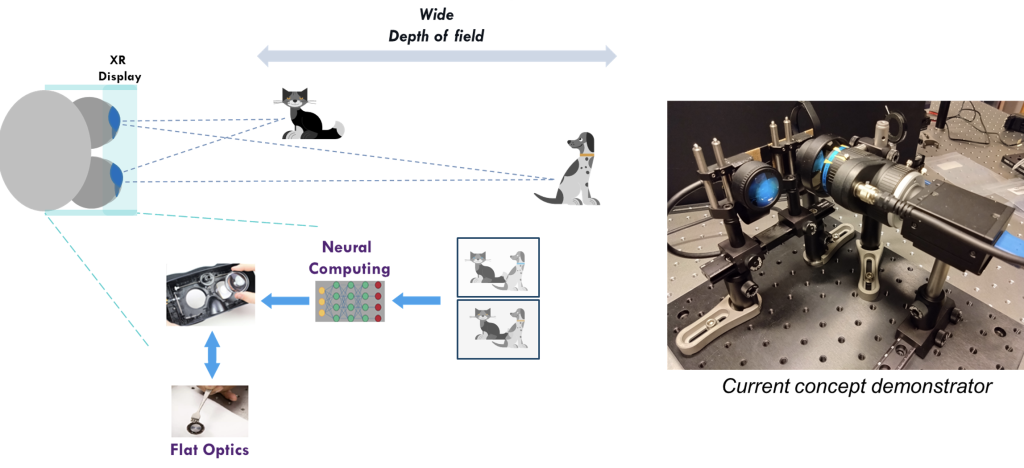M.Sc. Thesis Opportunities
We are excited to announce two Master’s thesis topics available within 3D Media Group. These projects offer graduate students the opportunity to engage in cutting-edge research, gain hands-on experience with state-of-the-art technology, and contribute to advancements in immersive visual technologies.
These theses are excellent opportunities for students seeking to deepen their expertise and expand their professional horizons. Read further for more details on the topics, eligibility, and application process.
Project title: Wavefront sensing for XR displays
Description: Extended reality (XR) is an emerging technology, where near-eye (head-mounted) XR displays can seamlessly combine real and virtual worlds and deliver immersive visual experiences. Existing traditional (stereoscopic) near-eye displays, however, suffer from the conflicting visual cues (the so-called vergence-accommodation conflict) problem due to underlying simplistic display technology, which in turn creates unsatisfactory user experience (visual discomfort, fatigue, nausea) especially in prolonged use.
We have developed novel display methods (In-Part page, patent, paper_1, paper_2) that can address the visual discomfort in the existing stereo displays. Using advanced machine learning algorithms, we have developed computational display methods combining lightweight optical elements with neural processing algorithms; and we have demonstrated the efficacy of our in the lab with a benchtop setup (See Figure below). In this project, we aim to improve our existing display method through integrating wavefront sensing (Shack-Hartmann sensor) in our machine learning framework.

Project tasks: You will integrate Shack-Hartmann sensor in the existing display setup and characterize the optical aberrations in the XR display through wavefront measurements. You will then utilize such information in the machine learning framework to further optimize the neural processing algorithm.
Outcomes: 1) gaining hands-on experience in designing and experimenting with XR displays, 2) learning the principles of wavefront sensing, 3) gaining experience in the application of machine learning in optical design and utilization of optical models/measurements in tandem with neural image processing algorithms.
For whom: MSc students (targeting an MSc. thesis)
Prerequisites: MATLAB/Python programming skills, basics of image processing, basic knowledge of machine learning and CNNs. Knowledge of optics is a plus.
Start date: As soon as possible. End date: The project is intended for 6-9 months; extension is possible based on progress.
Contact: Erdem Sahin (erdem.sahin@tuni.fi)
Project title: Computational hyperspectral imaging
Description: Conventional color cameras integrate the visible spectrum within three different bands (color channels), using red, green, and blue color filters. Hyperspectral (HS) cameras can record much denser bands, which in turn provide richer information regarding the material properties and the lighting. Such information is beneficial in various areas such as remote sensing, medical imaging, and computer vision. However, capturing HS data with single shot is challenging due to its complexity. The compressive HS cameras address this challenge, with the help of coded measurements and post-processing.

We have designed novel computational HS cameras utilizing state-of-the-art machine learning (ML) algorithms (see the figure above, and related publications: paper 1, paper 2). In particular, the end-to-end ML model incorporates optical image formation model and neural post-processing algorithms (implemented through neural networks).
Projects tasks: You will experimentally validate the efficacy of the proposed method on a tabletop setup, in comparison with a ground truth method, e.g., acquired via spectrometer. You will use the ML framework to further improve the performance of the existing system, e.g., by using different neural network architectures at the post-processing stage.
Outcomes: 1) gaining hands-on experience in designing and experimenting with optical, especially hyperspectral imaging, setups, 2) gaining experience in the application of machine learning in optical design and utilization of optical models/measurements in tandem with neural image processing algorithms. 3) Getting familiar with rigorous simulation of imaging, including modelling and optimization of optics and sensor components
For whom: MSc students (targeting an MSc. thesis)
Prerequisites: MATLAB/Python programming skills, basics of image processing, basic knowledge of machine learning and CNNs. Knowledge of optics is a plus.
Start date: As soon as possible. End date: The project is intended for 6-9 months; extension is possible based on progress.
Contact: Erdem Sahin (erdem.sahin@tuni.fi)


